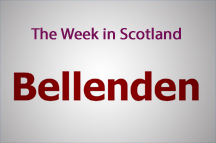 As we look forward to a new political year in Scotland most attention is focusing on the election of a Scottish government on 5th May. Given the fairly static SNP lead in the polls it looks like we will see Nicola Sturgeon receive a direct electoral mandate for the first time. Many of the same SNP faces are likely to feature in a new cabinet, but beneath their top line of big names, the SNP will replenish their team with a number of new faces that are set to enter the Holyrood Parliament for the first time come the election.
As we look forward to a new political year in Scotland most attention is focusing on the election of a Scottish government on 5th May. Given the fairly static SNP lead in the polls it looks like we will see Nicola Sturgeon receive a direct electoral mandate for the first time. Many of the same SNP faces are likely to feature in a new cabinet, but beneath their top line of big names, the SNP will replenish their team with a number of new faces that are set to enter the Holyrood Parliament for the first time come the election.
With many activists and senior party figures heading off to Westminster, now is the time for the new breed of SNP activist to come to the fore. My belief is this will see a move in the positioning of the SNP to the left on a number of substantive policy issues for the next few years.
On the Labour side there is massive competition for places on the regional lists, as their confidence in winning any constituency seats remains low following the nightmare of 2015. I must declare an interest at this point as my wife, Johanna Baxter is one of the candidates for the West of Scotland Labour selection. Having rung around members from my home in North Ayrshire, it seems like many long standing members are not confident of Labour’s chances in 2016. This is translating into a great deal of competition for the votes needed to get to the top of the list, particularly amongst fiercely competitive groups of male candidates in some areas. Positions might well depend on the switch of a handful of votes from one candidate to another.
2016 will also be the first full year of Kezia Dugdale’s leadership. Judgement will inevitably be passed on her ability to fulfil her promise and cut through the political bubble to gain recognition with voters as she attempts to drag the Scottish Labour Party into the post-referendum age. Against the background noise of Corbyn and his Momentum outriders this might not prove to be the easiest of tasks.
 For public affairs practitioners there is also the Lobbying Bill. Being debated in Holyrood this week, the Bill which - although better than its Westminster counterpart - needs to ensure: clarity of the expectations around disclose, a limit on any additional administrative burden and costs, as well as a level playing field for all organisations engaging with politicians professionally.
For public affairs practitioners there is also the Lobbying Bill. Being debated in Holyrood this week, the Bill which - although better than its Westminster counterpart - needs to ensure: clarity of the expectations around disclose, a limit on any additional administrative burden and costs, as well as a level playing field for all organisations engaging with politicians professionally.
Over the next year it will also be interesting to see the analysis of how the SNP is performing in Government. To date they have had a relatively easy ride from the media. Pro-independence publications, such as the Herald, have been more focused on talking up the benefits of nationalism and attacking the Westminster-based Conservative Government rather than holding the SNP administration to account for its delivery of services. That seems to be beginning to change a little. The debacle over the Forth Bridge closure, the reorganisation of colleges, the Scottish NHS and the recent flooding issues have seen the SNP take some flack. But this criticism is failing as yet to impact on the polls. That said, once voters start to see past the issue of nationalism then the SNP might find they are facing a far more challenging and robust approach from the fourth estate.
The Conservatives are hoping after many years in the wilderness in Scotland for a bit of a revival under Ruth Davidson post the referendum. However, despite signs of life the Tories are only providing a challenge in a few seats around Scotland. It is clearly proving difficult for Davidson to translate her undoubted popularity with ordinary people into support for the Conservative Party.
And Willie Rennie’s Lib Dems? Survival is their primary focus.














